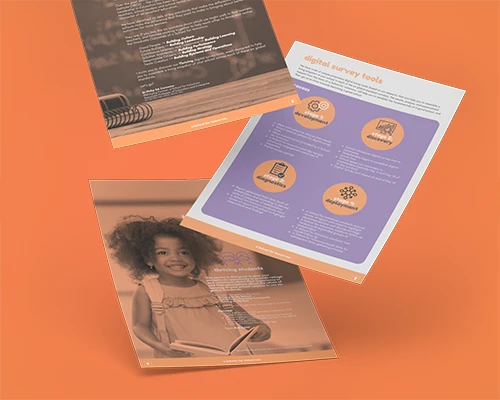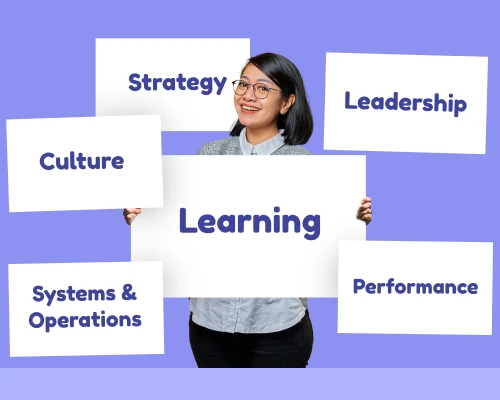
Dr Phil Cummins
Mar 19, 2023 | 3 minute read
Student Voice and School Leadership
Dr Phil Cummins examines school leadership that nurtures and protects the voices of our students.
Promotion
a School for tomorrow's
A School for tomorrow. Courses
Grow in purpose and practice as you learn, live, lead and work.
Let's go!We need to be the leaders of schools who hear what our students are saying. We need to encourage the development of their voices as they anticipate and explain their vision for the future.
The work of leadership in a school that promotes the constructive and (ideally) selfless contribution of student voice should emphasise:
- Future-Fit Modelling, Preparation & Service: students need to know how best to make their voice heard within their school and its community.
- Empathy, Representation & Reporting: in expressing their voice, they need to demonstrate how they are learning to show empathy, compassion and care for others.
As they develop in this fashion, students will need to acquire increasing capacity to appreciate the quality of complexity: our world challenges us with a volume, pace and intensity that can make the tangle of the many layers of our experience of life seem impossible. Great leaders communicate to good effect; they use their voices to broker hope for others:
“You will provide hope to others about what is possible and create certainty in a world that is complex, loud and busy.”
Ref: www.aschoolfortomorrow.com/the-pathway-to-excellence/lead
From our CIRCLE Global Educational Research Program, we can see that teachers understand this, but when asked to describe their practice at its best, they tend to focus on one of the aspects of what this role might be:
It is clear that all of our teachers have a role to play in providing and supporting the leadership that fosters student voice. As one teacher sums it up:
“I feel every teacher can be seen as a role model for the students.”
Perhaps a more integrated approach will help them to model for their students the capacity to manage complexity with greater assuredness.
Expert teachers understand this. Their sense of purpose for their leadership is shaped by their recognition of the importance of validation. They support their students to become future builders who can understand complexity and communicate the progress that is being made on the journey. Their practice focuses on:
- Future-Fit Modelling, Preparation & Service: they have a clear understanding of how they can best serve their students, their school and its community (and they articulate this to their students).
- Empathy, Representation & Reporting: they help their students to find their voice and express their feelings about their strengths and vulnerabilities.
We need to show our students how to become willing future builders with the capacity to manage complexity with authenticity. We must help them to be deft at reaching different audiences with communication that is clear, accurate and persuasive.
Often referred to as ‘human’ or ‘soft’ skills, the global educational research program of a School for tomorrow has identified six core Employability Skills. Educating for Student Voice supports the development of the communication required for our students to thrive in the world beyond school. The ability to weave a compelling and true narrative that connects all of the strands to a single thread that expresses the aspirations and journey of a whole community is integral to this:
You know what great leaders do? Great leaders make great stories. They connect the dots. And I think that that's what the leaders of schools need to be doing.
Valerie Hannon | Game Changers insight*
|
Quality |
Attributes |
Capabilities |
|
Communication |
Influence |
I can persuade, motivate and negotiate effectively to succeed in my organisation's work. |
|
Understanding Others |
I understand the needs of colleagues, clients, and customers. |
|
|
Building Relationships |
I am able to build positive relationships with internal and external stakeholders. |
|
|
Connecting With Audiences |
I can communicate ideas clearly with a variety of different audiences. |
|
|
Basic Numeracy |
I can apply basic numeracy to logically summarise information and data |
|
|
Listening, Speaking and Writing |
I listen carefully and use a range of formal and informal techniques for speaking and writing. |
As leaders in our schools, we need to recognise that the natural tendency of many of us is to stay with what we know; we need to help everyone to see beyond yesterday and today through to tomorrow’s world and the learning that will equip, empower and enable it to happen**. As Adriano and I argue in our recent book***:
School leaders need to be thinking about aspirations … and using them to form a vision that can act as both the rationale and the articulation of how this vision will be realised within their school.
Ref: Game Changers: Leading Today's Learning for Tomorrow's World (Hawker Brownlow Education 2022) p.68
Let’s go!
Phil
* You can listen to Valerie Hannon’s Game Changers Episode here: https://podcasts.apple.com/au/podcast/game-changers/id1503430745?i=1000469472082
** You can learn more about helping members of your school community to build their leadership capacity here: https://www.aschoolfortomorrow.com/courses
*** Game Changers: Leading Today’s Learning For Tomorrow’s World is available for purchase here: https://www.hbe.com.au/hb1338.html
Related Content
.png)
Article
Student Voice and School Culture
Products & Services
Discover our 'Thriving' Digital Survey ToolsLike what you’ve read?
Let’s keep the conversation going.
